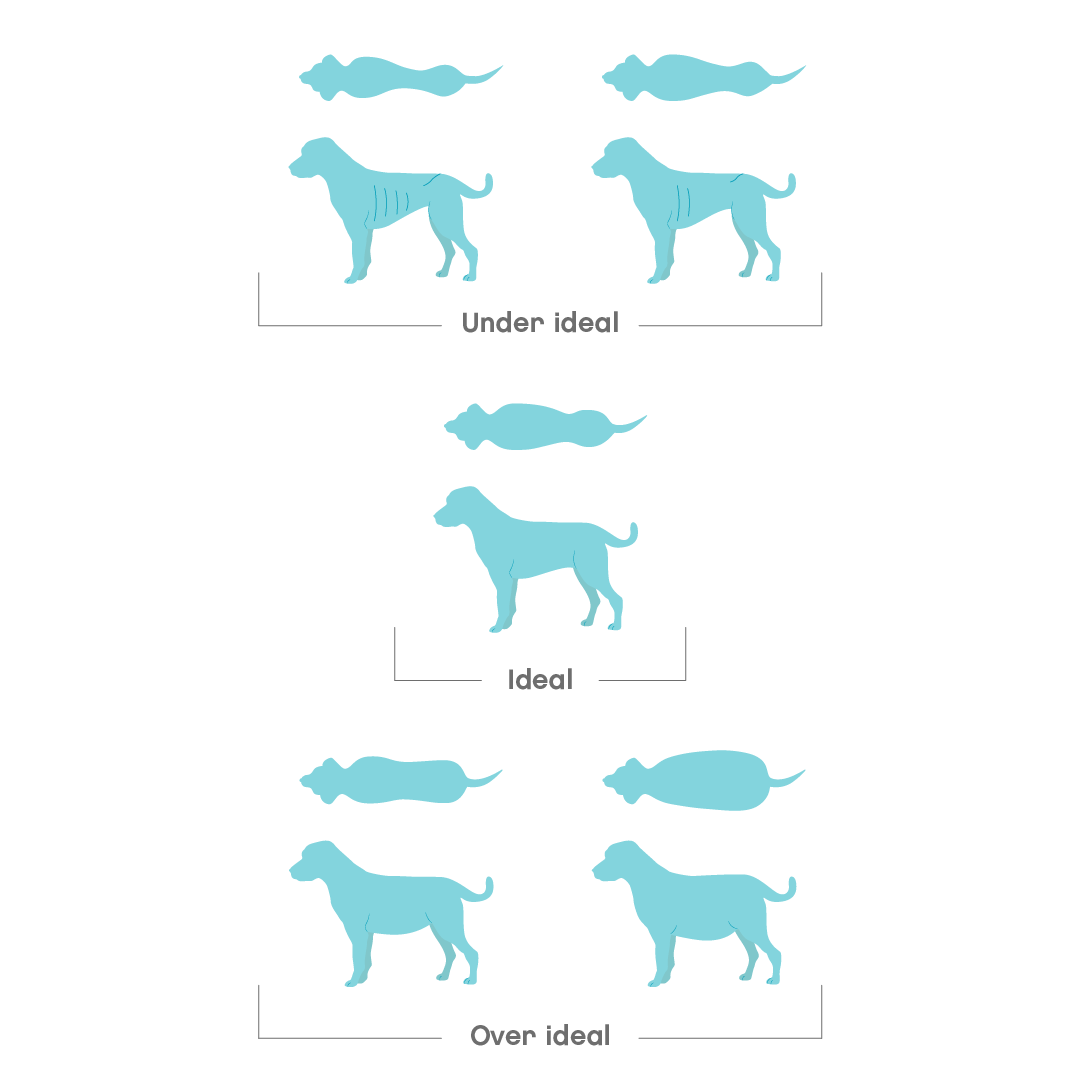Weight loss in dogs is a very common but non-specific sign. It can be caused by mild, easy-to-treat conditions or more serious, life-threatening diseases. Any age of dog can develop weight loss due to medical reasons.
Many conditions causing weight loss are treatable, especially with an early diagnosis. Cachexia is the name used for an extreme stage of weight loss. Weight loss in dogs becomes very serious when it is over 10% of their normal body weight.
What to do
What to do if your dog is losing weight
Both sudden and gradual weight loss in dogs can indicate they have an underlying disease. It’s best to get a full check-up with your local vet if your dog is losing weight.
- Keep a regular diary of your dog’s weight to let your vet know how quickly it’s changing.
- Monitor for any other symptoms, such as drinking more than normal, vomiting, changes to their stools, lethargy, or appetite changes.
- Allow your dog to rest to reduce the amount of energy they are using up.
- Keep a record of how much they are eating, including the brand and type of food and any treats.
- Be aware if your dog is losing weight and/or muscle. Muscle loss can indicate different problems than just weight loss alone.

If your dog is losing weight, it’s best to speak to a vet as soon as possible. Our Joii vets are available 24 hours a day for advice; call us now.
Causes
The most common causes of weight loss in dogs
There are many causes of weight loss in dogs. Some conditions are more common at different ages. Read more about the most common causes of weight loss by following the links:
Puppies
- Parasites: worms, giardia
- Incorrect diet / malnutrition
- Heart problems
- Liver shunt
Adult dogs
- Dental problems
- Diabetes
- Addison’s disease
- Heart problems
- Poor-quality diet
- Pancreatic disorders
Senior dogs
- Dental problems
- Heart problems
- Kidney disease
- Liver disease
- Cancer
- Poor-quality diet
The following symptoms can also lead to weight loss at all ages:
- Vomiting and diarrhoea, both short-term or chronic
- Pain
- Stress
- Reduced appetite
When to worry
When you should be worried about weight loss in dogs
Seek help from a vet if:
- Your dog suddenly loses a lot of weight
- Your dog is losing weight and has other symptoms such as vomiting or drinking more than normal
Call us and speak to one of our Joii Vets if:
- You want help assessing your dogs body condition score
- You have any questions about what diet to feed your dog
Prevention
Tips on how to prevent your dog from losing weight
- Keep your dog up to date with vaccinations and parasite preventatives. Puppies need to be wormed more frequently than older dogs.
- Make sure your dog is on a complete diet, adequate for their age and lifestyle. And that they are actually eating the correct amounts of this food. The WSAVA website has a toolkit to help pet owner’s know what to look for when selecting dog food.
- Maintain a good oral hygiene routine for your dog from as early as possible. Brushing their teeth is the best way to do this.
- Get regular check-ups with your vet, at least once a year. Checking their teeth, weight, heart, and rest of the body can pick up any problems early on. Regular blood tests help with early detection of kidney, liver, and other organ diseases.
- Feed your dog in a safe space, somewhere that is quiet and comfortable for them. Competition against other pets can lead to a reduced intake of food.
- Follow our guide on how to prevent and reduce stress in dogs.
- Speak to a vet as soon as possible if your dog starts to show signs of being unwell. Vomiting, diarrhoea, and reduced appetite can all quickly lead to weight loss in dogs.
- Keep your dog at a healthy weight and body condition to reduce symptoms of diseases such as arthritis and heart disease.
Body Condition Score (BCS) is a scale that gives a practical evaluation of the fat coverage of your dogs body. By checking how easy or not it is to feel certain bony areas of the body, a score is then produced. There are several scales, from 1 to 5 or 1 to 9. The ideal body condition lies in the middle, so either 3/5 or 5/9. The body areas normally checked for fat coverage are: 1. ribs and spine 2. hips and shoulders 3. waist Here are a few tips on how to do it. With your pet in a standing position:
Body Condition Scoring (BCS) in dogs

Our Joii vets are available 24 hours a day for advice. Call us now if you have any concerns about your dog.
Diagnosis
Diagnosis of weight loss in dogs
A full physical exam with your vet is always an important step when investigating weight loss in dogs. It’s important to let your vet know of any other symptoms or changes that you’ve noticed at home.
In most cases, your vet will run some tests to help them come to a diagnosis:
- Blood tests
- Urine tests
- Stool tests
- Imaging, such as x-rays, ultrasound or MRI
- Biopsy of the tummy, intestines or other organs
Home treatment
How to help a dog with weight loss at home
It’s always best to start with a physical exam with your local vet to look for any medical problems.
- Special diets may be recommended if your dog is diagnosed with medical issues such as dental problems, cancer, or kidney disease. Otherwise, an energy dense food such as Hills Prescription Diet a/d may be recommended. Always speak to a vet before using specific foods, as they may be unsuitable for some dogs.
- Make sure they have a quiet, safe space to eat, drink and rest
- Give any medication at the dose and frequency recommended by your vet
- Weigh your dog regularly to make sure they are not losing any more weight
- Read our blog on how much to feed your dog to find out more.
Vet treatment
Vet treatment for weight loss in dogs
Treatment for weight loss depends on what the cause is. Your vet may start by advising a higher calorie diet and monitoring at home while waiting for test results. If your dog is extremely ill, your vet will likely keep them in for close observation and, if needed, feeding via a special tube.
Your vet can help you calculate your dog’s RER (resting energy requirement) and MER (maintenance energy requirement). These are important measurements to work out how much your dog should be eating on a daily basis, and they change throughout your dog’s life.
Risk
Are some dogs at more risk of weight loss than others?
- Puppies lose weight quickly, especially if they are not digesting enough nutrients. Diets for growing dogs should contain higher amounts of energy, protein, calcium, and phosphorus.
- Senior or immunocompromised dogs may be more susceptible to illness if they lose weight. They can lose weight more easily if they become ill.
- Thin or underweight dogs are more at risk of having a weaker immune system, reduced mobility and problems with wound healing.
Dogs that have higher energy requirements:
- Puppies have higher energy requirements to help with growth and development.
- Pregnant dogs, especially the last 3-4 weeks: at least 10% increase in food allowance each week from week 6 of pregnancy.
- Lactating and feeding puppies: at least 1.5 times maintenance increase for first week, which then increases as the puppies grow. Feeding puppy food is recommended for pregnant and lactating dogs, as it provides more energy and is easily digestible.
- Athletic (working and sporting) dogs: such as sheep dogs, guide dogs, and those that do agility. The amount of energy they need depends on the output of each individual.
- Intact dogs have a higher energy requirement than neutered dogs. Neutering reduces calorie requirements by 25-30%.
Other causes of weight loss in dogs
Follow the links to read more about other causes of weight loss in dogs:
- Arthritis
- Old age
- Megaoesophagus
- Stomach ulcers
- Pyometra
- Exocrine pancreatic insufficiency
- Vestibular disease
- Protein losing enteropathy and nephropathy
- Hyperthyroidism
- Allergies: food and environmental
- Infections: Salmonella, Leptospirosis, Parvovirus, Leishmania, Lyme disease








